Whether you are building or upgrading a home server, selecting the right central processing unit (CPU) is crucial. It acts as the brain of your server, directly influencing its performance, energy efficiency, and ability to handle multiple tasks simultaneously.
Our detailed exploration into the finest CPUs for home servers involved extensive testing and evaluation of a diverse array of processors. This was achieved in partnership with leading industry experts and through the application of scenarios drawn from real-life usage, focusing on metrics such as
- Cores and Threads: For optimal server multitasking, prefer CPUs with more cores and threads, e.g., 8-core/16-thread over 4-core/8-thread.
- Clock Speeds: Higher clock speeds (4.5 GHz to 5.0 GHz) significantly enhance home server performance compared to lower speeds (around 3.0 GHz).
- Cache: Larger cache sizes (e.g., 30M) improve multitasking and server task handling over smaller caches (12M).
Among the 6 best home server CPUs, Ryzen 5 from AMD is the front runner, offering exceptional performances delivering outstanding performance while remaining affordably priced. For further information, please see the details provided below.
Our “Buying Guide” dives deep into what makes a CPU suitable for home server applications, breaking down complex technical jargon into easy-to-understand concepts.
Outline
ToggleBest Home Server CPUs List
| Best Home Server CPUs | Cores & Threads | Clock Speeds | Cache | Buy Now |
|---|---|---|---|---|
| AMD Ryzen 5 Home Server CPUs | 6 cores, 12 threads | 3.9 GHz base, 4.4 GHz boost | 16M L3 cache | Check On Amazon |
| AMD Ryzen 7 Home Server CPUs | 8 cores, 16 threads | 3.8 GHz base, 4.6 GHz boost | 16M L3 cache | Check On Amazon |
| Intel Core i7 Home Server CPUs | 8 performance cores, 4 efficiency cores, 20 threads | 2.7 GHz & 3.6 GHz base, 3.8 GHz & 5.0 GHz boost | 25M L3 cache | Check On Amazon |
| Intel Core i9 Home Server CPUs | 8 performance cores, 4 efficiency cores, 20 threads | 2.4 GHz & 3.2 GHz base, 3.9 GHz & 5.2 GHz boost | 30M L3 cache | Check On Amazon |
| Intel Core i5 Home Server CPUs | 6 performance cores, 4 efficiency cores, 16 threads | 2.8 GHz & 3.7 GHz base, 3.6 GHz & 4.9 GHz boost | 20M L3 cache | Check On Amazon |
| Intel Core i5-12400 Home Server CPUs | 6 cores, 12 threads | 2.5 GHz base, 4.4 GHz boost | 18M L3 cache | Check On Amazon |
| Intel (12th Gen) i3 Home Server CPUs | 4 cores, 8 threads | 3.3 GHz base, 4.3 GHz boost | 12M L3 cache | Check On Amazon |
Best Home Server CPUs Reviews
1. AMD ryzen 5 Home Server CPUs
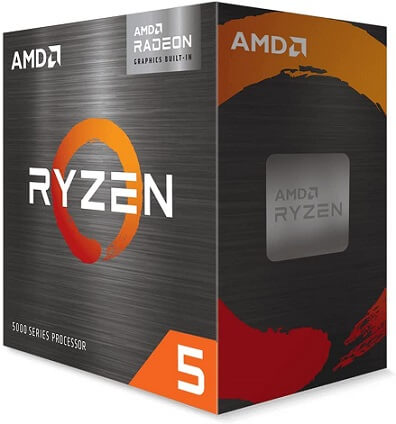
The AMD Ryzen 5 5600G home server CPU is present in the 1st position of this list since this is one of the cheapest yet one of the most powerful options given here. Even at the given entry-level price tag, this home server CPU comes with 6 cores and 12 threads. More importantly, you get a base clock speed of 3.9 GHz and a boost clock speed of up to 4.4 GHz with this processor. And since AMD even includes a 16M cache with this home server CPU, you can expect quite amazing performance from it. You even get the AMD Radeon Vega 7 iGPU with this processor, which offers fairly great performance.
Coming to the compatibility of this processor, it uses the AMD AM4 CPU socket for connecting to your motherboard. You also get support for up to 128 GB RAM with up to 3200 MHz DDR4 speeds for decent performance at the given price. Despite being an entry-level home server CPU, this AMD Ryzen 5 also supports overclocking for both the CPU and memory speeds. And the best part about this processor is that you get all of this at a fairly low TDP of just 65 watts which makes this processor quite practical.
Best Features
- Uses a total of 6 cores and 12 threads
- Offers a base clock speed of 3.9 GHz
- Rated boost clock speed of up to 4.4 GHz
- Includes 16M L3 cache
- Paired along with the AMD Radeon Vega 7 iGPU
- Supports up to 128 GB RAM at up to 3200 MHz DDR4 speeds
- Offers overclocking support for CPU and memory speeds
- Works at an TDP of 65 watts
- Backed by a 3 year long warranty period
Pros
- Excellent home server CPU for buyers on a tight budget
- Pretty amazing performance numbers for an entry level home server CPU
- Includes a handy air cooler inside the box for an even better value for money
Cons
- Included CPU socket is not supported with next generation AMD motherboards
2. AMD Ryzen 7 Home Server CPUs
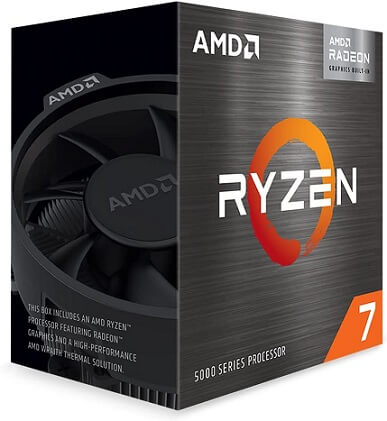
AMD’s Ryzen 7 5700G home server CPU is present in the 2nd position of this listicle as it is hands down the best value-for-money option given here if you want something powerful. Unlike most other home server CPUs in its class, this AMD one features 8 cores and 16 threads which is perfect for a home server. In fact, even with the given core count, you still get a pretty great base clock of 3.8 GHz and a boost clock of up to 4.6 GHz with this processor. That being said, even with the higher price tag, this AMD Ryzen 7 only features 16M cache which is a bit low. Another similarity between this and the Ryzen 5 CPU is the AMD Radeon Vega 7 iGPU used by it.
Because this is an AMD CPU of the previous generation, it relies on the AMD AM4 CPU socket for installation in your motherboard. Since this is a high-end AMD Ryzen processor, its support for up to 128 GB RAM at up to 3200 MHz DDR4 speeds is to be expected. And because you would want the best performance out of such a high-end AMD processor, it also supports both CPU and memory overclocking for even better performance. In case you are worried about the TDP of this high-end CPU, you will be glad to know that it is rated for just 65 watts which is definitely amazing.
Best Features
- Uses a total of 8 cores and 16 threads
- Offers a base clock speed of 3.8 GHz
- Rated boost clock speed of up to 4.6 GHz
- Includes 16M L3 cache
- Paired along with the AMD Radeon Vega 7 iGPU
- Supports up to 128 GB RAM at up to 3200 MHz DDR4 speeds
- Offers overclocking support for CPU and memory speeds
- Works at an TDP of 65 watts
- Backed by a 3 year long warranty period
Pros
- Amazing value for money home server CPU for high end performance numbers
- Excellent TDP rating despite offering class leading specifications and performance
- Features an included air cooler for cooling the CPU without paying a premium
Cons
- Could have included more cache considering the given price and core count
3. Intel Core i7 Home Server CPUs
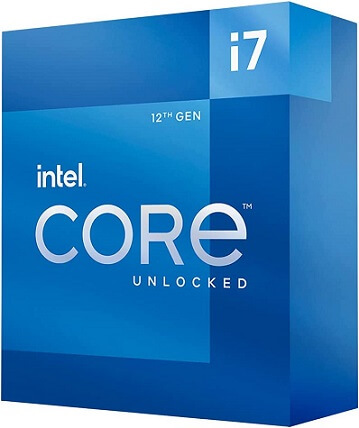
This Intel Core i7 12700K home server CPU is present in the 3rd position of this article because this is definitely one of the most powerful options out there if you can afford the same. Since this is a newer Intel processor, it features a unique core and thread layout which includes 8 performance cores, 4 efficiency cores, and 20 threads. And even with the given number of threads, you get amazing base clock speeds of 2.7 GHz and 3.6 GHz along with boost clock speeds of up to 3.8 GHz and 5.0 GHz for the efficiency and performance cores, respectively. While it may not be the highest, its included 25M cache is definitely quite good. The Intel UHD 770 iGPU used by this processor also offers fairly high-end performance.
Unlike AMD’s processor offerings, this Intel processor uses the Intel LGA1700 CPU socket. And if you have a compatible motherboard, you can use up to 128 GB RAM at up to 4800 MHz DDR5 speeds, which is definitely a great thing. If this much performance is not enough for you, then you will be glad to know that this home server CPU supports both CPU and memory overclocking since it is a K series processor. That being said, unlike AMD’s processors, this Intel is not the most efficient one due to its given TDP of 125 watts.
Best Features
- Uses a total of 8 performance cores, 4 efficiency cores, and 12 threads
- Offers a base clock speeds of 2.7 GHz and 3.6 GHz
- Rated boost clock speed of up to 3.8 GHz and 5.0 GHz
- Includes 25M L3 cache
- Paired along with the Intel UHD 770 iGPU
- Supports up to 128 GB RAM at up to 4800 MHz DDR5 speeds
- Offers overclocking support for CPU and memory speeds
- Works at a TDP of 125 watts
- Backed by a 3 year long warranty period
Pros
- One of the most powerful modern home server CPU options out there
- Supports the latest DDR5 RAM along with amazing speeds for great performance
- Allows for overclocking for even more performance if used with the right motherboard
Cons
- Quite a high TDP rating despite having a few efficiency cores
4. Intel Core i9 Home Server CPUs
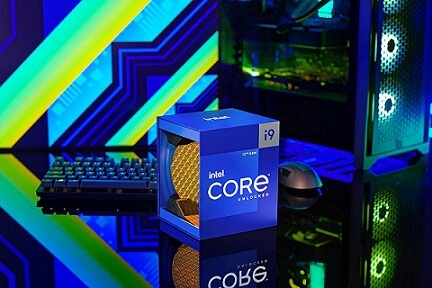
The Intel Core i9 12900K home server CPU is given in this list since it is hands down the best performing option discussed here which makes it perfect for heavy duty usage. Similar to the previous Core i7 offering from Intel, this one also uses a unique core and thread layout which includes 8 performance cores, 8 efficiency cores, and 24 threads.
Being a top of the line CPU, it offers amazing base clock speeds of 2.4 GHz and 3.2 GHz along with boost clock speeds of up to 3.9 GHz and 5.2 GHz for its efficiency and performance cores respectively. Another great thing about this Intel Core i9 CPU is that you get 30M cache with it. While it might not be the most powerful, its Intel UHD 770 iGPU is still good for basic media encoding.
Just like the previously mentioned Intel Core i7 CPU, this one also uses the Intel LGA1700 CPU socket for installing this processor. Another benefit of going with a newer version of Intel processors is that it also supports up to 128 GB RAM at up to 4800 MHz DDR5 speeds. As you would expect from a top of the line Intel processor, this K series CPU allows you to overclock the CPU as well as the memory if needed. Unfortunately, because you get such high performance numbers with this CPU, it has a pretty high TDP of 125 watts which is certainly something to keep in mind.
Best Features
- Uses a total of 8 performance cores, 8 efficiency cores, and 24 threads
- Offers a base clock speed of 2.4 GHz and 3.2 GHz
- Rated boost clock speed of up to 3.9 GHz and 5.2 GHz
- Includes 30M L3 cache
- Paired along with the Intel UHD 770 iGPU
- Supports up to 128 GB RAM at up to 4800 MHz DDR5 speeds
- Offers overclocking support for CPU and memory speeds
- Works at an TDP of 125 watts
- Backed by a 3 year long warranty period
Pros
- Best in class option for a high performance home server CPU
- Excellent performance numbers including superb clock speeds
- Great option for overclocking with amazing scalable results
Cons
- Quite an expensive and premium home server CPU compared with others
5. Intel Core i5 Home Server CPUs
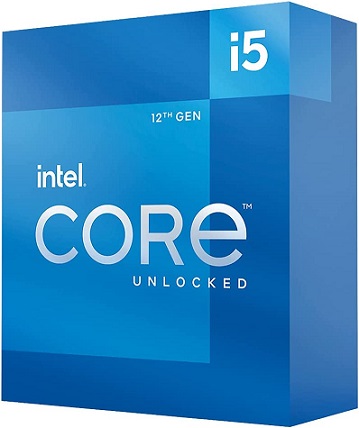
Intel’s Core i5 12600K home server CPU is given in this listicle as this can be a great option if you want excellent single-threaded performance without paying a premium. That being said, this processor is also fairly decent for multitasking thanks to its 6 performance cores, 4 efficiency cores, and 16 threads. But the best thing about this processor has to be its clock speeds which include base clock speeds of 2.8 GHz and 3.7 GHz along with boost clock speeds of up to 3.6 GHz and 4.9 GHz for its efficiency and performance cores, respectively. And while it may not be the highest, the given 20M cache is definitely good for the given price. Similar to its higher-end alternatives, this Intel CPU also uses the Intel UHD 770 iGPU for decent media encoding performance.
Taking a look at the physical design of this home server CPU, it also uses the latest Intel LGA1700 CPU socket. More importantly, as it is a high-end K series processor, it can work with up to 128 GB RAM at up to 4800 MHz DDR5 speeds. Another benefit of going with a K series processor like this one is that it allows you to overclock both the CPU and memory speeds if needed. Although, just like other K series processors offered by Intel, this one also has a very high TDP of 125 watts which can be a concern for some users.
Best Features
- Uses a total of 6 performance cores, 4 efficiency cores, and 16 threads
- Offers a base clock speed of 2.8 GHz and 3.7 GHz
- Rated boost clock speed of up to 3.6 GHz and 4.9 GHz
- Includes 20M L3 cache
- Paired along with the Intel UHD 770 iGPU
- Supports up to 128 GB RAM at up to 4800 MHz DDR5 speeds
- Offers overclocking support for CPU and memory speeds
- Works at an TDP of 125 watts
- Backed by a 3 year long warranty period
Pros
- Amazing single threaded performance thanks to its given boost clock speed ratings
- Supports complete overclocking similar to higher end Intel K series processors
- Decent multithreaded performance thanks to additional efficiency cores
Cons
- Not the easiest to cool home server CPU because of a high TDP rating
6. Intel Core i5-12400 Home Server CPUs
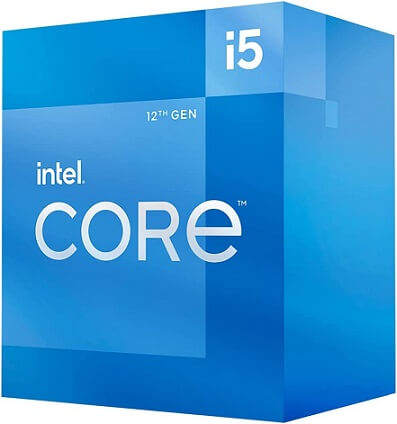
The Intel Core i5 12400 home server CPU is given in this article because this can be a viable option for those who want to build an Intel-based server without paying a premium. Unlike the higher-end K series processor, this one offers a more common core layout which includes 6 cores and 12 threads in total. And with the given cores and threads, you get a fairly decent base clock speed of 2.5 GHz and a boost clock speed of up to 4.4 GHz. You even get 18M cache with this Intel processor, which is pretty good for the given price tag. That being said, unlike higher-end K series processors, this one comes with the entry level Intel UHD 730 iGPU.
Thankfully, Intel still uses the standard Intel LGA1700 CPU socket with this processor for maximum compatibility. It even supports up to 128 GB RAM at up to 4800 MHz DDR5 speeds for the best possible performance. And while this non-K series processor does not support CPU overclocking, it still features memory overclocking support. But the best benefit of going with a non-K series Intel processor is that it has a TDP of just 65 watts which is much more practical than high-end K series CPUs.
Best Features
- Uses a total of 6 cores and 12 threads
- Offers a base clock speed of 2.5 GHz
- Rated boost clock speed of up to 4.4 GHz
- Includes 18M L3 cache
- Paired along with the Intel UHD 730 iGPU
- Supports up to 128 GB RAM at up to 4800 MHz DDR4 speeds
- Offers overclocking support for memory speeds
- Works at a TDP of 65 watts
- Backed by a 3 year long warranty period
Pros
- Great all rounder home server CPU without charging a premium for the same
- Supports the latest Intel CPU socket along with DDR5 RAM for future compatibility
- Pretty low TDP rating compared with other Intel processors
Cons
- Included iGPU is definitely a step down in comparison to higher end K series chips
7. Intel (12th Gen) i3 Home Server CPUs
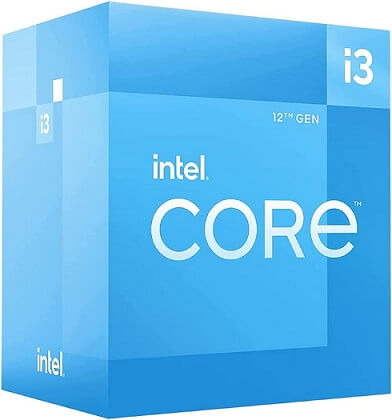
The Intel Core i3 12100 home server CPU is mentioned in this list since it is the cheapest option given here and can be perfect if you are on a budget. As you would expect from an entry-level processor from Intel, this CPU uses 4 cores and 8 threads for its multithreaded performance. That being said, it does offer a fairly decent base clock speed of 3.3 GHz and a boost clock speed of 4.3 GHz for the given price tag. Unfortunately, since it is an entry-level option, it only features a 12M cache which is a bit low compared to others. Similarly, it also uses the entry-level Intel UHD 730 iGPU and not the higher-end models offered by Intel.
Fortunately, Intel does offer a few similarities between this Core i3 and other high end options including its Intel LGA1700 CPU socket. This entry level home server CPU even works with up to 128 GB RAM at up to 4800 MHz DDR5 speeds. And while it may not support CPU overclocking, you can still overclock the memory if you want to. Since the Core i3 is a budget tier processor, it has the lowest TDP of just 60 watts in this article as well.
Best Features
- Uses a total of 4 cores and 8 threads
- Offers a base clock speed of 3.3 GHz
- Rated boost clock speed of up to 4.3 GHz
- Includes 12M L3 cache
- Paired along with the Intel UHD 730 iGPU
- Supports up to 128 GB RAM at up to 4800 MHz DDR5 speeds
- Offers overclocking support for memory speeds
- Works at an TDP of 60 watts
- Backed by a 3 year long warranty period
Pros
- One of the most affordable and cheapest home server CPUs available out there
- Lowest TDP rating in its class for easy cooling even with basic CPU coolers
- Works quite well with the latest DDR5 RAM for a great future upgrade path
Cons
- Not the most ideal home server CPU for any kind of heavy duty tasks
Buying Guide for the Best Home Server CPU
This buying guide is designed to simplify the process, breaking down the essential aspects to evaluate when choosing the right home server CPU.
1. Cores & Threads
Cores and threads are pivotal in a CPU’s multitasking ability, with higher counts equating to better performance. Home server CPUs range from 4 cores and 8 threads to 16 cores and 24 threads, affecting how many tasks can be handled simultaneously. Modern processors may blend performance and efficiency cores, enhancing multitasking with varying power consumption.
2. Clock Speeds
Clock speed measures a CPU’s operational frequency, split into base and boost speeds. Base clock speed is the minimum speed your CPU maintains, often between 2.5 to 3.0 GHz, indicating consistent performance levels.
Modern CPUs feature varied base speeds for efficiency versus performance cores. Boost clock speed, achieving up to 4.5 GHz or higher, represents the peak frequency for intensive tasks, primarily enhancing single-threaded performance by temporarily speeding up one or two cores.
3. Cache
The cache is a critical component of a CPU, facilitating data transfer between the CPU and RAM. A larger cache, indicated by ratings like 20M, 25M, or 30M, significantly enhances multitasking performance by storing frequently accessed data for quick retrieval. For optimal multitasking, a CPU with a 30M cache is preferable.
4. Memory Support
A high-performance CPU should be paired with high-capacity and high-speed memory to maximize multitasking efficiency. Key considerations include the maximum memory capacity, which typically reaches up to 128 GB, suitable for most needs. Additionally, compatibility with memory speeds is vital; while basic CPUs support up to 3200 MHz DDR4 RAM, advanced models are compatible with up to 4800 MHz DDR5 RAM, offering superior performance.
5. Integrated Graphics
For tasks like media encoding on a home server, such as running a Plex server, integrated graphics in a CPU can be crucial to avoid the need for a costly dedicated graphics card. CPUs with integrated GPUs, like AMD Radeon Vega 7 or Intel UHD 730/770, offer sufficient performance for hardware-accelerated tasks, including media encoding, without supporting high-end gaming.
6. CPU Socket Compatibility
Ensuring your CPU matches your motherboard’s socket type is essential for compatibility, not performance. Home server CPUs typically fit into either AMD AM4 or Intel LGA1700 sockets. Compatibility between your motherboard’s socket and your CPU’s socket type is a must for a successful build.
7. Overclocking Support
Overclocking allows you to exceed a CPU’s rated clock and memory speeds for better performance. AMD CPUs generally support overclocking for both, while Intel restricts this feature to its K series. Ensure compatibility with an overclocking-capable motherboard if you plan to enhance your home server CPU’s performance this way.
8. TDP & Power Consumption
TDP (Thermal Design Power) indicates a CPU’s heat output and power consumption, with ratings from 65 watts to 125 watts or more. Higher TDP values mean more heat and higher power needs, requiring adequate cooling solutions and a robust power supply to manage effectively.
9. CPU Cooler
Effective heat management is crucial for preventing thermal throttling and maintaining performance in home server CPUs. Some CPUs come with an air cooler included, offering immediate use and better value. If not provided, you may need to purchase a third-party air or liquid cooler, depending on your CPU’s heat output.
10. Warranty
Durability is key for home server CPUs, with most expected to operate flawlessly for several years. Both AMD and Intel typically offer a 3-year warranty on their processors, ensuring your investment is protected and that your server remains operational over an extended period before any potential upgrades.
Home Server for CPU – FAQs
Ans: The most important factor is the balance between performance (core count, clock speeds) and power efficiency (TDP), tailored to your server’s intended tasks.
Ans: Yes, desktop CPUs can be used for home servers, especially if they meet your performance and power efficiency needs.
Ans: Integrated graphics are only necessary if your server tasks include media encoding or other graphical outputs without a dedicated GPU.
Ans: Check the CPU socket type and chipset compatibility listed in your motherboard’s specifications against the CPU’s requirements.
Ans: Overclocking can enhance performance but may increase heat and power consumption; it’s not typically necessary for standard server tasks.
Ans: AMD CPUs often offer better multi-core performance for the price, while Intel CPUs may have better single-core performance and power efficiency.
Ans: More cache helps with multitasking and speed, but the ideal amount depends on your specific server workloads.
Ans: Not necessarily; a higher TDP indicates higher power consumption and heat output, not always better performance.
Ans: Choose memory speeds supported by your CPU and motherboard, with higher speeds offering better performance but at a higher cost.
Ans: With proper care and assuming no hardware failures, a home server CPU can last 5 years or more before technological advancements justify an upgrade.
Conclusion
Having a home server offers numerous benefits, from running a Plex server and NAS drive to workstation tasks, and it’s simpler than ever thanks to powerful modern hardware.
Below, we highlight our top recommendations for the best home server CPUs, offering a concise resource for your selection.
- For those on a budget, the AMD ryzen 5 Home Server CPUs is an excellent entry-level choice.
- At the high end, the Intel Core i9 Home Server CPUs stands out for premium performance.
- For great value, the AMD Ryzen 7 Home Server CPUs makes an exceptional mid-range option.

